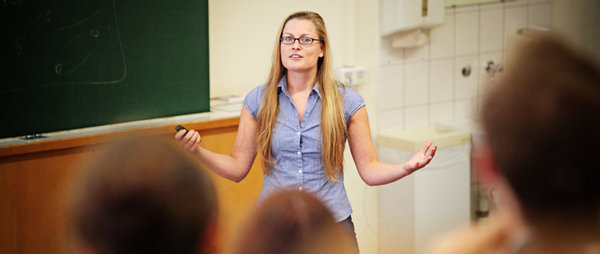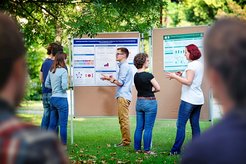
It's all about the mix
The Jena Summer School brings legal scholars, psychologists and economists together

Poster presentation at the Summer School in Jena – thanks to the interdisciplinary focus, there is input from several different perspectives.
Every year in July and August, young and established scientists meet for a Summer School in Jena lasting four weeks. They come from all over the world to learn, discuss and work on joint projects. By the end, lasting acquaintanceships have often been formed and new insights gained.
When a group of people travel together and everyone can pay what they want: how does each individual decide? – Certainly a complicated question which five young scientists in the Summer School tackled for their game theory experiment. The task involves a multiplicity of factors: How well do the members of the group know each other? How conscious is each member of their image? Is this a one-off journey or a more frequent occurrence?
In the space of a mere four weeks, Michael Edem Fiagbenu, Meirav Furth-Matzkin, Elisa Hofmann, Asri Özgümüs and Amir Mohammad Tahamtan develop a hypothesis, design an experimental concept and finally conduct a trial which would normally take at least half a year. Other summer school participants serve as guinea pigs, which is why the end result is not representative – nevertheless, the participants enjoy an experience that gives them food for thought for a long time to come.
The so-called group assignment, the trial experiment in fast forward mode, is a special element of the Jena Summer School. It is being staged this year for the tenth time by the IMPRS on Adapting Behaviour in a Fundamentally Uncertain World. The graduate school of the MPI for Human Development and the MPI for the Study of Societies as well as the University of Jena combines legal, economic and psychological approaches in order to explain human behaviour.
More applicants than places
The objective of the Summer School is to teach content and methods from the three disciplines. In addition to the trial experiment that is being held in four groups this time, there are also courses, exercises and lectures on offer. Around 30 young researchers will take part. For internal participants, the programme is part of the IMPRS curriculum. The other half have applied from outside, and there are regularly more applicants than places. Doctoral students from the fields of psychology, law and economics, who are working on an interdisciplinary topic, have a good chance of being accepted. Students on master's degree courses can also take part if there are free places available. The small circle is a correspondingly colourful mixture: an Israeli legal scholar from Harvard, a Turkish economist from Trento, an Italian Psychologist from Bath, young researchers from St. Gallen and Rotterdam, Mumbai and Teheran, Bonn, Berlin and Jena itself. The course fee for four weeks is 150 euros and in conclusion, certificates are awarded for courses passed.
Working in an Interdisciplinary manner is a new experience for most of the young participants. The group assignment gives them the chance to try out in practice how different disciplines can be brought under one roof. "We have an exciting blend: two economists, one legal scholar and two psychologists, one of who is also a neuroscientist and the other a media expert and philosopher", says Asri Özgümüs who is doing his doctorate at the University of Göttingen. "You have to be open to different perspectives. Sometimes, we are on different wavelengths - but in the end, we always find a consensus."
Sven Hoeppner, a postdoc from the University of Gent, is here for the fourth time: "The interdisciplinary programme is unique in Europe, at least in my field", says the legal scholar, full of enthusiasm. He also appreciates the fact that the programme changes every year. "This year was the first time that a course was repeated. But the fact that it had been further developed meant that it was again a plus factor." The interdisciplinary programme is also a challenge for the lecturers, according to organizer Susanne Büchner. "The courses should be manageable for those unfamiliar with the subject, and benefit young colleagues from one’s own discipline. That isn't easy, but it usually works well." Susann Fiedler from the MPI for Research on Collective Goods has also had positive experiences with her course in Jena, above all with the doctoral students' thirst for knowledge: "You don't often have an audience as attentive as that. They were all so quick on the uptake, and they identified so many cross-references with their own subjects that in the end the lack of prior knowledge was fairly irrelevant."
Small, tight-knit community
The small group of only 30 participants makes it easier for the young people to come into direct contact with the established scientists. Some lecturers, for example, are present for the poster presentation with which the doctoral students introduce their topics. They all eat together or get together in the evening for a beer and continue to discuss work-related questions in a relaxed atmosphere. Weekend excursions offer further opportunities for exchange.
The network forged by those participating in the group assignment is particularly long-lasting. Some subsequently conduct their experiment with actual test subjects and publish the results. But even if the collaboration doesn’t extend this far – the contacts come in useful time and again for the students' own work, as Jena doctoral student Christina Strobel, who took part in the group assignment in 2015, can testify: "Whenever I have a problem with analyzing data, I remember there was that guy who really knew the subject well, and then I can simply write to him."
